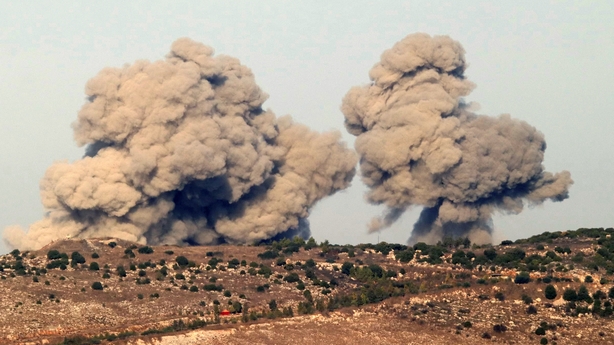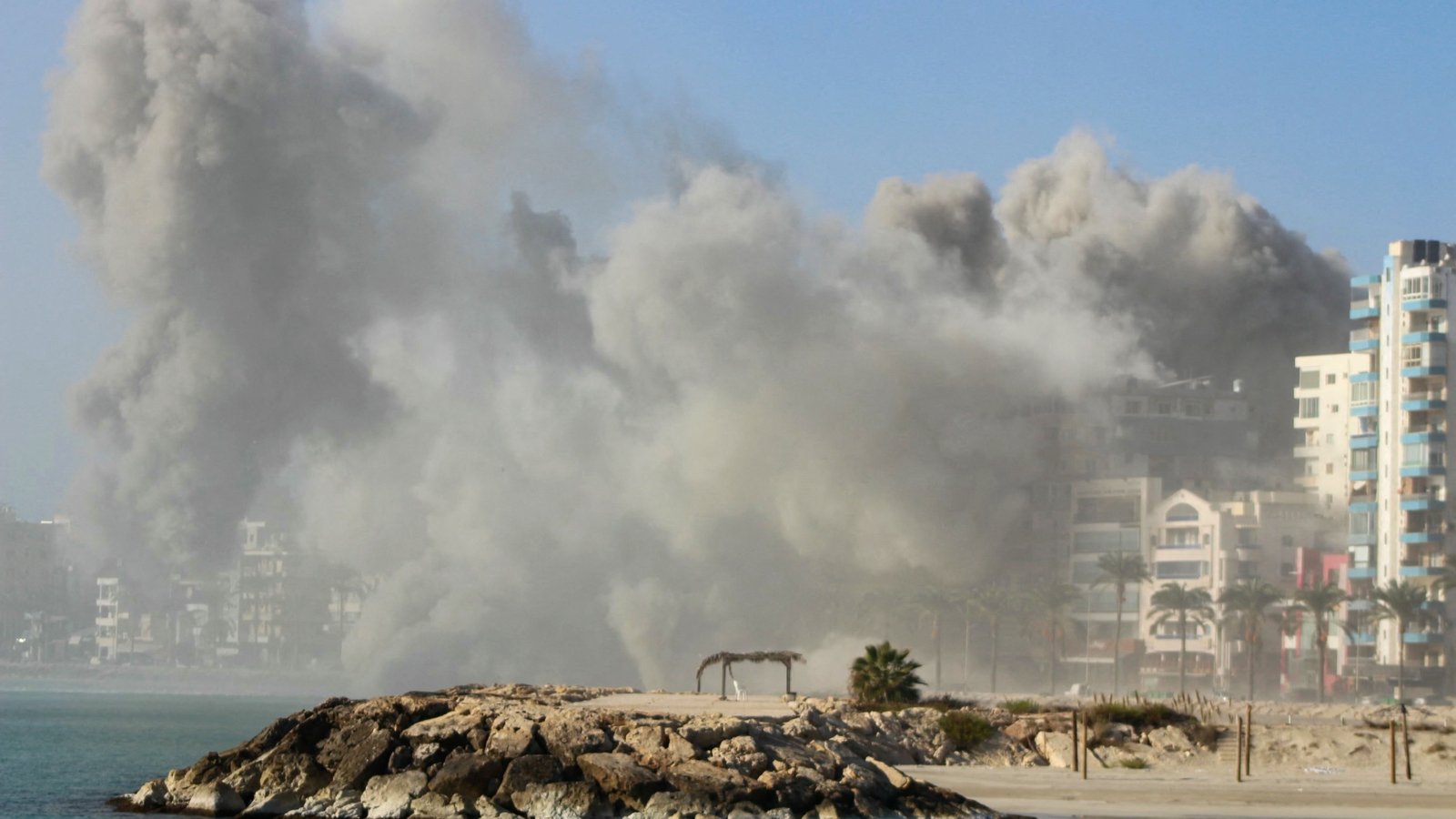Irans foreign ministry has said that the country will “respond firmly and effectively” to deadly Israeli strikes on military sites over the weekend.
“We are using all available means to respond firmly and effectively to the aggression of the Zionist regime,” spokesman Esmaeil Baghaei told a news conference.
“The nature of our response will depend on the nature of the attack.”
On Saturday, Israel conducted air strikes on military sites in Iran in response to Iran’s 1 October attack on Israel, itself retaliation for the killing of Iran-backed militant leaders and a Revolutionary Guards commander.
At least four soldiers were killed in the strikes, according to the military, and Iranian media has reported that a civilian was also killed in the attack.
“The martyr Allahverdi Rahimpour, a civilian who was killed near Tehran during the recent attack by the Zionist regime, has been buried,” the local Fars news agency reported.
Tasnim news agency also reported the death, saying Rahimpour worked as “a (security) guard in a company” and lived in the city of Nassimshahr southwest of Tehran.
Authorities had not previously reported civilian deaths in the strikes.
Saturday’s strikes took place against the backdrop of Israel’s ongoing war with Hamas, which expanded in recent weeks to also focus on Hezbollah in Lebanon.
Both groups are part of the “axis of resistance” aligned with Iran against Israel.
Mr Baghaei said a ceasefire in Gaza and Lebanon has remained the “goal” for Iran.

He further urged the United Nations Security Council, which is set to hold a meeting this afternoon on the Israeli strikes, to take a “decisive and firm” stance with regards to the attack.
Iran had called for the meeting yesterday.
During the conference, Mr Baghaei decried Israel’s “abuse” of Iraq’s airspace to launch the attack on Iran.
“The Zionist regime does not respect any limits in its law-breaking approach… it has repeatedly violated the airspace of many countries,” he said.
Palestinians say 100,000 residents trapped in Israel’s north Gaza assault
Israeli tanks have thrust deeper into two north Gaza towns and a historic refugee camp, trapping around 100,000 civilians, the Palestinian emergency service has said, in what the Israeli military said were operations to root out regrouping Hamas militants.
The IDF said soldiers captured around 100 suspected Hamas militants in a raid into Kamal Adwan hospital in the Jabalia camp. Hamas and medics have denied any militant presence at the hospital.
We need your consent to load this rte-player contentWe use rte-player to manage extra content that can set cookies on your device and collect data about your activity. Please review their details and accept them to load the content.Manage Preferences
Gaza’s health ministry said at least 19 people were killed by Israeli airstrikes and bombardment, 13 of them in the north of the shattered coastal territory.
The Palestinian Civil Emergency Service said around 100,000 people were marooned in Jabalia, Beit Lahiya and Beit Hanoun without medical or food supplies. Reuters could not verify the number independently.
The emergency service said its operations had ground to a halt because of the three-week-long Israeli assault back into the north, an area where the military said it had wiped out viable Hamas combat forces earlier in the year-long war.
As talks led by the US, Egypt and Qatar to broker a ceasefire resumed yesterday after multiple abortive attempts, Egypt’s president proposed an initial two-day truce to exchange four Israeli hostages of Hamas for some Palestinian prisoners, to be followed by talks within 10 days on a permanent ceasefire.
There was no public comment from Israel or Hamas, who have stuck to irreconcilable conditions for ending the war.

Gaza’s war has kindled wider Middle East conflict, raising fears of global instability, with Israeli forces invading south Lebanon to stop Hezbollah rocketing northern Israel in support of fellow Iran-backed militant group Hamas in Gaza.
It has also triggered rare direct clashes between Middle East arch-foes Israel and Iran. At the weekend, Israeli warplanes pounded missiles sites in Iran in retaliation for a 1 October Iranian missile volley at Israel.
North Gaza’s three hospitals, where officials refused orders by the Israeli army to evacuate, said they were hardly operating. At least two had been damaged by Israeli fire during the assault and run out of medical, food and fuel stocks.
At least one doctor, a nurse and two child patients had died in those hospitals due to a lack of treatment in the past week.
The Gaza health ministry has said there was only one of roughly 70 medical staff – a paediatrician – was left at Kamal Adwan Hospital after Israel “detained and expelled” the others.
The Israeli military said soldiers who raided the hospital “apprehended approximately 100 terrorists from the compound, including terrorists who attempted to escape during the evacuation of civilians. Inside the hospital, they found weapons, terror funds, and intelligence documents”.
North Gaza residents said Israeli forces were besieging schools and other shelters housing displaced families, ordering them out before rounding up men and ushering women and children out of the area towards Gaza City and the south.
Only a few families headed to southern Gaza as the majority preferred to relocate temporarily in Gaza City, fearing they could otherwise never regain access to their homes.
Some said they had written their death notices in case they died from the constant bombardment, saying they would prefer death to displacement.
“While the world is busy with Lebanon and new nonsense talk about a few days of ceasefire (in Gaza), the Israeli occupation is wiping out north Gaza and displacing its people,” a resident of Jabalia told Reuters by a chat app.
“(But) neither (Israeli Prime Minister Benjamin) Netanyahu nor Eiland will be able to take us out of northern Gaza.”
Giora Eiland, a former head of Israel’s National Security Council, was the lead author of a much-debated proposal dubbed “the generals’ plan” that would see Israel rapidly clear northern Gaza of civilians before starving out surviving Hamas fighters by cutting off their water and food supplies.
This month’s Israeli tank assault drew Palestinian accusations that the military has embraced Eiland’s concept, which he envisaged as a short-term step to defeat Hamas in the north but which Palestinians fear is meant to clear the area for good to carve out a buffer zone for the military after the war.
The Israeli military has denied pursuing any such plan. It says its forces operate in keeping with international law and that it targets militants who hide among the civilian population which they use as human shields, a charge Hamas denies.
North Gaza was the first part of the enclave to be hammered by Israel’s ground offensive into the territory after Hamas’ cross-border attack on 7 October 2023, with intensive bombing largely flattening towns like Beit Hanoun and Beit Lahiya.
Nevertheless, Hamas-led militants continue to attack Israeli forces in hit-and-run operations with anti-tank rockets, mortar salvoes and bombs planted in buildings, streets and other areas where they anticipate Israeli forces taking up positions.

